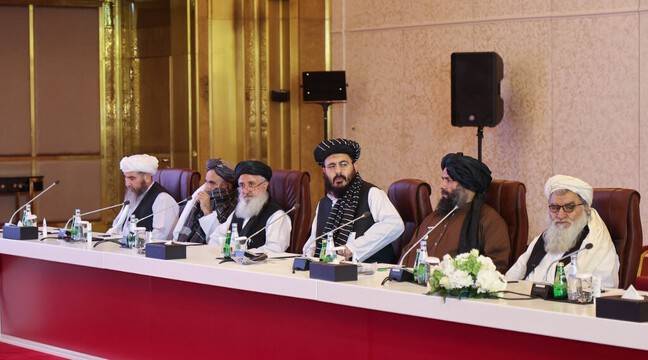
Taliban leader promotes “political” deal despite military successes
In a message on the occasion of Eid Al-Adha Taliban I repeated, this Sunday, to stay “resolutely in favor of a political settlement” in
Afghanistan, «
Despite the progress and military victories, “Recorded by the rebels over the past two months.
“Instead of relying on foreigners, let us solve our problems among us (Afghans) and save our homeland from the prevailing crisis,” Hebatullah Akhundzadeh continues in this message for the three-day Islamic Eid al-Adha starting July 20.
The government denied US air support
Against the background of the massive attack by the militants against the Afghan forcesOn Saturday in Doha, Qatar, a delegation from the Afghan government and the Taliban resumed talks that began in September and have so far been stalled. “We, on our part, are determined to find a solution through discussions, but the opposite camp continues to waste time,” Hebatullah Akhundzadeh said in his letter. It was launched in early May, thanks
Beginning of the final withdrawal of foreign forces from the countryThe insurgent offensive met little resistance from the Afghan forces and allowed them to capture large rural areas of Afghanistan and important border posts with Iran, Turkmenistan, Tajikistan and Pakistan.
Denied critical US air support, Afghan government forces essentially no longer control major hubs and provincial capitals. Some are besieged by the rebels but they have not recently launched a major offensive against these towns, save for a brief incursion in July into Qala Nau, the capital of Badghis province, where they were expelled several days later. Fighting. The Taliban leader’s letter made no mention of a ceasefire on the occasion of Eid al-Adha. Over the years, the rebels occasionally declared truces to mark Muslim holidays.
“Girls’ Education”
In his message, the Taliban leader then revealed a series of commitments from the future “Islamic Emirate” in power in Kabul. The Islamic Emirate was the name of the Taliban regime that ruled Afghanistan between 1996 and 2001, and was expelled by an international coalition led by the United States, after its refusal to extradite al-Qaeda leader Osama bin Laden. In the aftermath of the September 11 attacks.
“We want good and strong diplomatic, economic and political relations (…) with all countries of the world, including the United States” and “we fully assure the neighboring countries, the region and the world, that Afghanistan does not want to “allow anyone to threaten the security of any other country from its territory,” Hebatullah Akhundzada says he promotes literacy and asserts that “the Islamic Emirate will pay special attention and strive to create a suitable environment for girls’ education within the framework of the great Islamic law”, while girls under their system were prevented from school and women from working…although no No attacks are publicized, however many attacks on schools have also been attributed to the Taliban in the past 20 years.
A more modern image
The Taliban leader assured journalists of his “commitment to freedom of expression within the limits of Islamic law and national interests” and says he wants to work with international NGOs in the health sector. It also renews its promise to guarantee the security of diplomats, embassies, consulates, humanitarian organizations and foreign investors. Since Washington announced last year the final departure of foreign forces from Afghanistan, after an agreement with the Taliban, the latter has been trying to show a more modern and moderate picture, especially with regard to abroad.
The Taliban have long appeared to have operated under one effective command, and waged massive military campaigns, despite persistent rumors of disagreements within their leadership. But the question of what influence Taliban leaders will have on leaders on the ground and whether they will be able to get them to honor a potential peace agreement remains unanswered. In the face of the advance of the Taliban, who have recently approached Kabul, concern is growing in Afghanistan, particularly in the capital and among the educated elite and women, about the prospect of their return to power, which is likely to wipe out 20 years of progress, even if much of the Afghan countryside remains. Very traditional.

“Unapologetic pop culture trailblazer. Freelance troublemaker. Food guru. Alcohol fanatic. Gamer. Explorer. Thinker.”
